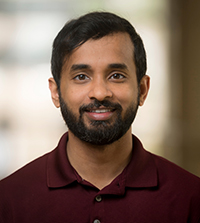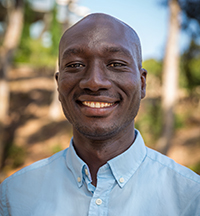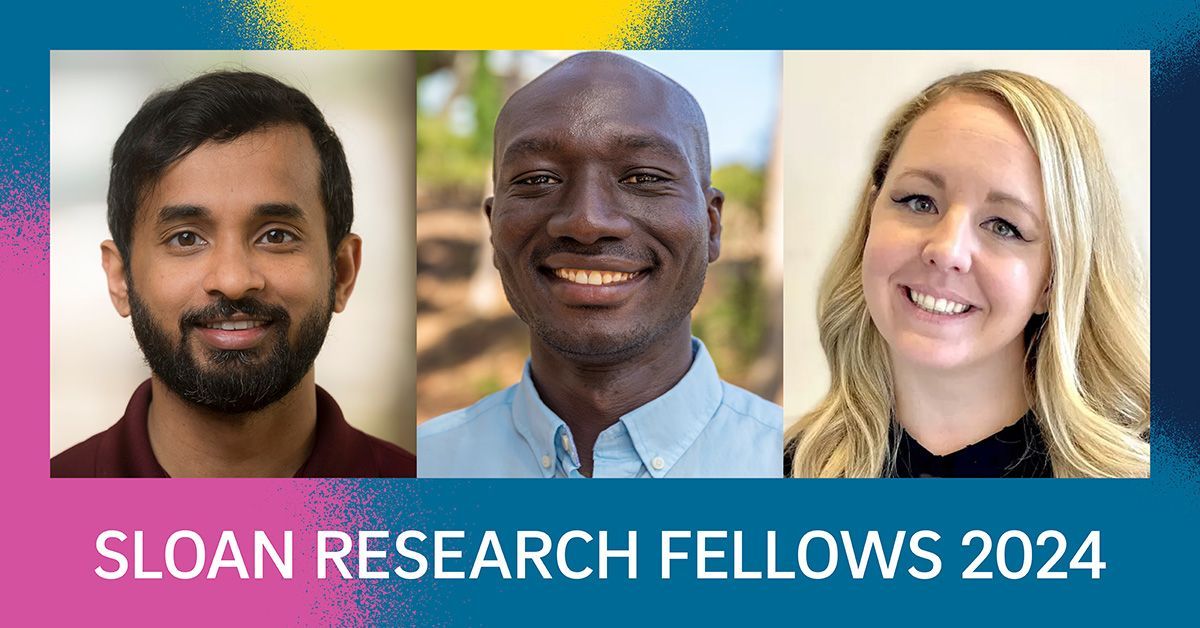Three Early Career Faculty Members Selected to Receive Sloan Research Fellowships
Story by:
Published Date
Article Content
University of California San Diego Assistant Professors Vineet Augustine, Abdoulaye Ndao and Monique Smith have been selected to receive 2024 Sloan Research Fellowships, the Alfred P. Sloan Foundation announced.
The UC San Diego researchers are among 126 scientists chosen by the Sloan Foundation to receive one of the most prestigious awards for early career scientists. Since they were first awarded in 1955, Sloan Research Fellowships have been awarded to 150 UC San Diego faculty members. Awardees are selected by a panel of senior scholars based on their research accomplishments, creativity and potential to become leaders in their fields.
“Sloan Research Fellowships are extraordinarily competitive awards involving the nominations of the most inventive and impactful early career scientists across the U.S. and Canada,” said Adam F. Falk, president of the Alfred P. Sloan Foundation. “We look forward to seeing how fellows take leading roles shaping the research agenda within their respective fields.”
Each year more than a thousand early career scientists are nominated for Sloan Research Fellowships. Each awardee receives a two-year, $75,000 fellowship that can be used flexibly to advance their research.
Here’s a snapshot of the 2024 UC San Diego Sloan Research Fellows and the areas they are investigating:

Vineet Augustine
Assistant Professor, Department of Neurobiology, School of Biological Sciences
Sloan Research Fellowship Awarded in Neuroscience
Vineet Augustine and members of his laboratory study how the brain coordinates signals from the body to maintain physiological balance and regulate behavior. Using state-of-the art neuroscience and molecular biology techniques, including large-scale electrophysiological recordings and machine learning, Augustine's investigations include how signals from the heart influence the brain in a recurrent loop and give rise to behavior in health and disease.
Learning more about the neurobiology of the heart offers significant promise for understanding cardiovascular disorders, which are globally the most common cause of death. In a recent study, Augustine and his colleagues for the first time identified the genetic pathway between the heart and brain tied to fainting. They found that vagal sensory neurons trigger fainting, laying a foundation for addressing fainting-related disorders.
“Being chosen as a Sloan Fellow is an incredible honor,” said Augustine. “It is an amazing community. This generous funding from the Sloan Foundation will allow us to be more ambitious in our scientific approach and contribute to the betterment of society.”

Abdoulaye Ndao
Assistant Professor, Department of Electrical and Computer Engineering, Jacobs School of Engineering
Sloan Research Fellowship Awarded in Physics
The Sloan Research Fellowship will allow Abdoulaye Ndao and his team to push forward interdisciplinary efforts at the boundaries between fundamental physics and technology development, whose solutions will likely have a broad impact on many fields, thus paving the way for groundbreaking advancements in photonic and biomedical applications.
“I am deeply honored to have been chosen as a 2024 Sloan Research Fellow, standing alongside a group of past fellows whose exceptional work continues to fascinate the scientific world,” said Ndao.

Monique Smith
Assistant Professor, Department of Neurobiology, School of Biological Sciences and Department of Neurosciences, School of Medicine
Sloan Research Fellowship Awarded in Neuroscience
The Smith Lab focuses on the mechanistic understanding of the neurobiological relationships between social behavior, pain and emotion, while identifying the neural circuitry that is disrupted in disease models related to empathy, addiction and depression.
Smith and her lab members specialize in developing novel behavioral models of complex and understudied social phenomena to ultimately identify and dissect the underlying neural circuitry. For example, Smith developed a novel model of empathy-like behavior in which mice can acquire pain or pain relief from a social interaction. The Smith Lab is currently using this model paired with cutting-edge circuit neuroscience techniques to elucidate the behavioral, neural and molecular mechanisms responsible for empathy.
“I am incredibly honored to be named a Sloan Fellow, joining a group of talented and impressive researchers that I have looked up to,” said Smith. “I am so grateful to the Sloan Foundation for believing in our work and supporting my lab at this critical early stage. I hope that our research will provide novel insights into the neural mechanisms of pain, pain relief and empathy, and ultimately have a positive impact on our society.”
Sloan Research Fellowships are awarded in coordination with the scientific community. The fellowships are open to scholars in chemistry, computer science, Earth System science, economics, mathematics, neuroscience and physics.
To date, 57 Sloan Research Fellows have received a Nobel Prize, including Moungi Bawendi, last year’s recipient of the Nobel Prize in Chemistry. Seventy-one have won the National Medal of Science, 17 have won the Fields Medal in mathematics and 23 have won the John Bates Clark Medal in economics. View a full list of current and former Sloan Research Fellows.
— With information from an Alfred P. Sloan Foundation news release
Share This:
You May Also Like
Stay in the Know
Keep up with all the latest from UC San Diego. Subscribe to the newsletter today.




